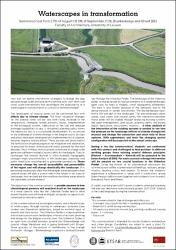Please use this identifier to cite or link to this item:
https://hdl.handle.net/20.500.11779/554| Title: | Summer School 'Waterscapes in Transformation', in Blankenberge and Ghent, Belgium |
| Authors: | Van Daele, Erik Pillen, Sis Gheysen, Maarten Scheerlinck, Kris Aydemir, Ayşe Zeynep Türkkan, Sevgi Gomez Escoda, Eulalia Carlos, Rute Labastida, Marta |
| Keywords: | Landscape Resilience Waterscape |
| Publisher: | University of Leuven, Faculty of Architecture |
| Source: | Van Daele, E., Pillen, S., Gheysen, M., Scheerlinck, K., Aydemir, A.Z., Turkkan, S., Gomez Escoda, E., Carlos, R., & Labastida, M. (27th of August till 6th of September 2018). Summer School 'Waterscapes in Transformation', in Blankenberge and Ghent, Belgium. University of Leuven |
| Abstract: | How can we define intervention strategies to bridge the gap between large scale and long term planning with short term and small scale interventions that reconfigure the accessibility of a waterscape in transformation as a result of climate change? The landscapes of coastal zones will be confronted first with effects due to climate change. The most influential changes for the coastal zones will be: sea level rising, increase of the temperature, changing rainfall patterns, floods, fragmentation of the ecological system, salinization of the soil and reduced drainage capabilities to sea. A thoughtful planning policy forms the necessary key to a sustainable development. As an answer to the challenge of climate change in the Belgian coast, policies and plans have been developed and implemented at a European, national, regional and local level. These policies and plans lead to the formulation of spatial proposals for mitigation and adaptation, to executed by major infrastructural works planned for the next decades. Most of these infrastructures, conceived at a large scale generate a different model of accessibility for the Belgian Coastal landscape: the relation dry/wet is often inverted, topographic changes imply discontinuities in the landscape, roadways and paths need to be reconfigured to guarantee connectivity. These measures change the overall accessibility and permeability of the region and will change drastically this landscape. It is becoming increasingly clear that these open areas between urban coastal zones will play a crucial role in the future of our coastal landscape. How resilient are they and how can these areas absorb the inevitable climate shocks? |
| URI: | https://hdl.handle.net/20.500.11779/554 https://arch.kuleuven.be/english/news/report-on-the-summerschool-2018waterscapes-in-transformation2019 |
| Appears in Collections: | Mimarlık Bölümü Koleksiyonu |
Files in This Item:
| File | Description | Size | Format | |
|---|---|---|---|---|
| tekstKULwebsite_Summerschool_WIT_web.pdf | Summer School Description | 479.88 kB | Adobe PDF |  View/Open |
CORE Recommender
Sorry the service is unavailable at the moment. Please try again later.
Items in GCRIS Repository are protected by copyright, with all rights reserved, unless otherwise indicated.